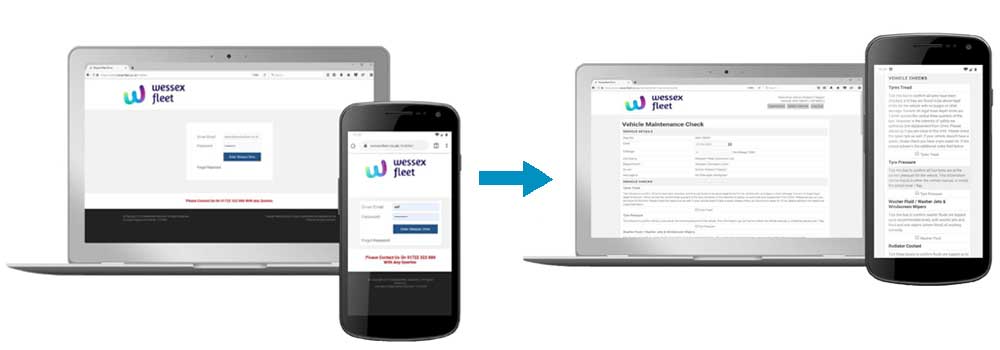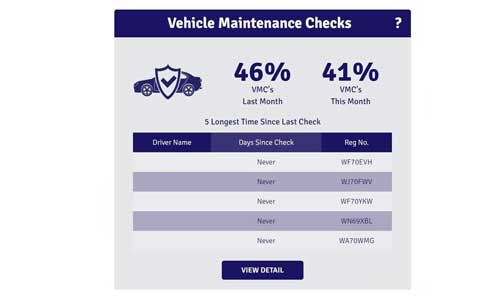When your business has a fleet of vehicles that are being driven by various drivers you will need to manage these vehicles and the regular maintenance of them to ensure they are in a safe, roadworthy condition.
What are Vehicle Maintenance Checks?
Vehicle maintenance checks, also known as VMCs, are the checks that drivers are asked to complete on their company provided vehicle at regular intervals to check and report on the vehicle’s condition.
The specific checks that drivers need to complete vary between businesses however there are some general checks that they will ask for, and that you will find useful to regularly been updated on by your drivers.
Why You Need Vehicle Maintenance Checks
There are a number of reasons that having regular VMCs in place will be beneficial for your business, your drivers and your fleet.
Regular VMCs ensure that there is an accurate record of the vehicle’s condition, which helps to keep the vehicle roadworthy and detect any areas of concern as quickly as possible. It also means that any necessary maintenance or repair work is completed quickly to avoid further damage by continued wear to the part.
An additional benefit of VMCs is that it gives the driver an increased sense of accountability for the company vehicle, which in turn encourages more responsible vehicle care from them. We know that some drivers will not treat a company vehicle with the same level of care as they would their personal car, which is why increasing their sense of accountability can be a great way to help encourage them to do so.
What Vehicle Maintenance Checks Involve
As we mentioned above the specific checks that drivers will be asked to complete may vary between companies or even vehicles if they have a specific use, for example a fridge van will require additional checks compared to a saloon car.
There are some checks that are standard across all vehicles though and we’ve listed these below to help give you a guideline of what your drivers might be asked to complete and to help you decide if there are any additional checks your business will want to ask.
- Tyre tread – should be within the legal limit of 1.6 mm deep around the central third of the wheel. Drivers should also check for any cuts, bulges or other damage to the tyre. They should not forget to check the spare tyre.
- Tyre pressure – all tyres should be at the correct pressure according to the vehicle manual.
- Washer fluid and jets – the washer fluid should be topped up to within the recommended levels and where jets are fitted they are all correctly working.
- Windscreen wipers – the blades are in a good condition and wipers are functioning properly.
- Radiator coolant – is at the recommended level and has been topped up to the correct level if needed.
- Oil level – is at the recommended level and topped up if needed.
- Windscreen – the windscreen has been checked for any chips or cracks, if there are any it should be noted so repairs can be arranged asap to prevent the windscreen from cracking further or shattering.
- Bodywork condition – the entire bodywork should be checked to ensure that there is no damage to the vehicle. Any damage or areas of concern should be noted as soon as they are spotted.
- Health and safety equipment – any health or safety equipment such as a first aid kit, fire extinguisher, warning triangle or hi-vis jacket is present in the vehicle and does not need replacing.
- Horn – the horn should be functioning, which can be checked with a quick press of the steering wheel in a remote area at a safe time.
- Lights and lenses – all brake, front, side and rear lights are working, including indicators, fog lights and any numberplate lights.
Some common additional checks include confirming that it is a non-smoking vehicle, that any necessary service has been completed or that they are sticking to the correct service intervals or that the vehicle holds a valid MOT if they are responsible for arranging this.
Another question you might ask the driver is to confirm that they have no health conditions that require DVLA notification since the vehicle’s last check. This does not relate to the condition of the vehicle, but instead checks that the driver is still in a fit condition to operate it.
What Can Happen If You Ignore Vehicle Maintenance Checks?
The reason that we advise you complete regular maintenance checks on all your vehicles is to make sure that they are all in the best working condition and to avoid your drivers being in unsafe vehicles, reduce the risk of accidents or permanent damage to the vehicle.
If you don't have these checks regularly completed then it can lead to simple necessary maintenance work or small damage going unnoticed and developing into a larger issue which can be more expensive, lead to a vehicle being off the road for longer and potentially be a danger to your employees and the general public.
Wessex Fleet Vehicle Maintenance Checks
As part of our fleet management and vehicle maintenance services Wessex Fleet offer a system for drivers to complete regular and thorough checks of their vehicle.
Drivers are able to log on via our app or online at www.wessexfleet.co.uk/mobile/ to quickly submit the required information.

They will then need to update the current mileage and then follow the simple process of walking around the car, checking each part of the vehicle as prompted and ticking the related box on the app to say the check has been completed. If they do spot anything of concern or have general comments to pass to the maintenance team there is an additional notes box they can write in.
Once completed they simply hit submit, and if there are any missed questions a notification will pop up and be highlighted in red so it can easily be updated. Then once it has successfully been submitted the driver will be emailed a pdf copy of the report.
Your internal fleet managers will see monthly compliance rates for the VMCs on the front page of their corporate log in page.
We’ve seen the compliance rates differ between companies, their departments and even at different times of the year if the business has a particularly busy period. In general we are pushing for 85% compliance as a minimum, as we know there may be times when drivers are busy, forgetful or on holiday so they might not be able to complete the checks in time. We see most of our clients reach but we encourage every driver to complete these checks.
Wessex Fleet will send a monthly reminder to each of your company car drivers asking them to log on and complete the necessary checks.

For more guides on managing your fleet head back to our business guides homepage where you can find guides on maintenance including lease vehicle maintenance and Wessex Fleet maintenance services.
